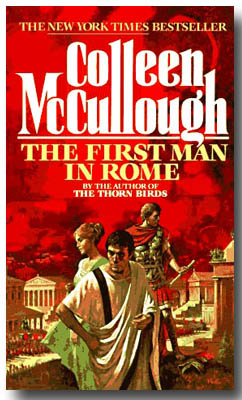 This one’s a long post, so I’ll need to break it into two posts.
This one’s a long post, so I’ll need to break it into two posts.
Two of the most powerful non-fictional books I’ve ever read are Citizen Solders by the late Stephen Ambrose – the book was incidentally one of the inspirations for Saving Private Ryan – and the other, The First Man in Rome by Colleen McCullough.
I remember that my first encounter to the Romans of old came from abridged historical novels in my dad’s collection that I read when in lower primary. It wasn’t long thereafter that I was introduced to the Asterix comic books and how a small village of Gauls continued to resisted the might of Gaius Julius Caesar. Now, of course all that was fiction, but it was a colorful introduction for my young inquiring mind then to read up further on this ancient civilization, and that reading interest has continued two decades since.
I first read The First Man in Rome in 1991. I didn’t buy the book from recommendation or reviews, but really because it concerned a time of history I love reading about, and at nearly 1100 pages, it would have been a lasting read. The book has been classified as historical fiction, but it’s so well researched and the characters all historically-based that I count it more non-fiction than fiction.
The book was the first of seven in the series, each one of them equally thick. The First Man in Rome started the saga with a retelling of Julius Caesar’s uncle, Gaius Marius: his political and military triumphs, and alliance and friendship with his protege Lucius Cornelius Sulla. The book ended with the birth of Julius Caesar, and the start of Marius’ disagreements with Sulla, which in the overall arc of history was the first rumblings of the earthquake that eventually led to the Roman Republic’s downfall.
This book even had its own several dozen-pages glossary in which the author explained the several terms of reference, historical footnotes, and her justifications regarding the dramatization of several characters and events in the book’s timeline. I still have my nearly 16 year old copy of this book now, though it’s become all brown from weather and age, with well-thumbed through pages.
(Continued in the next entry!)
Recent comments